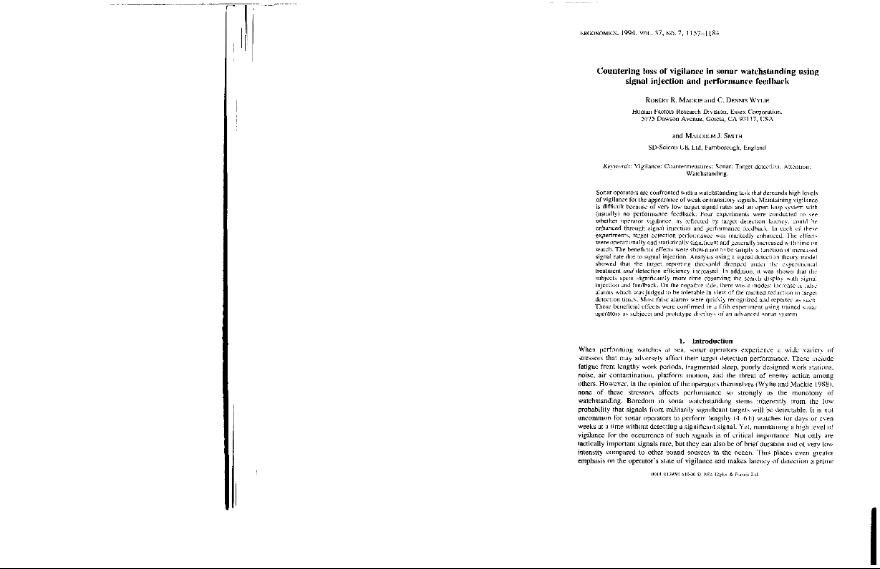Countering loss of vigilance in sonar watchstanding using signal injection and performance feedback

Contenido multimedia no disponible por derechos de autor o por acceso restringido. Contacte con la institución para más información.
| Tag | 1 | 2 | Value |
|---|---|---|---|
| LDR | 00000nab a2200000 i 4500 | ||
| 001 | MAP20071020888 | ||
| 003 | MAP | ||
| 005 | 20080418120408.0 | ||
| 007 | hzruuu---uuuu | ||
| 008 | 940915e19940701gbr|||| | |00010|eng d | ||
| 035 | $a6800012720 | ||
| 040 | $aMAP$bspa | ||
| 084 | $a875 | ||
| 100 | 1 | $0MAPA20080199289$aMackie, Robert R. | |
| 245 | 1 | 0 | $aCountering loss of vigilance in sonar watchstanding using signal injection and performance feedback$cRobert R. Mackie, C. Dennis Wyle and Malcom J. Smith |
| 520 | $aWhen performing watches at sea, sonar operators experience a wide variety of stressors that may adversely affect their target detection performance. These include fatigue from lengthy work periods, fragmented sleep, poorly designed work stations, noise, air contamination, platform motion, and the threat of enemy action among others. However, in the opinion of the operators themselves, none of these stressors affects performance so strongly as the monotony of watchstanding. Yet, maintaining a high level of vigilance for the occurrence of such signals is of critical importance. Not only are tactically important signals rare, but they can also be of brief duration and of very low intensity compared to other sound sources in the ocean. This places even greater emphasis on the operators' state of vigilance and makes latency of detection a prime measure of operator effectiveness | ||
| 650 | 1 | 1 | $0MAPA20080550653$aErgonomía |
| 650 | 1 | 1 | $0MAPA20080592219$aOperadores de sonar |
| 650 | 1 | 1 | $0MAPA20080556969$aVigilancia |
| 650 | 1 | 1 | $0MAPA20080578398$aTécnicas marinas |
| 650 | 1 | 1 | $0MAPA20080605155$aCondiciones de trabajo |
| 650 | 1 | 1 | $0MAPA20080540951$aEstrés |
| 650 | 1 | 1 | $0MAPA20080565657$aFatiga mental |
| 650 | 1 | 1 | $0MAPA20080543815$aEnsayos |
| 700 | 1 | $0MAPA20080152444$aWyle, C. Dennis | |
| 700 | 1 | $0MAPA20080207359$aSmith, Malcolm J. | |
| 740 | 0 | $aErgonomics | |
| 773 | 0 | $tErgonomics$dLondon and Washington$gVol. 37, nº 7, July 1994 ; p. 1157-1184 |

